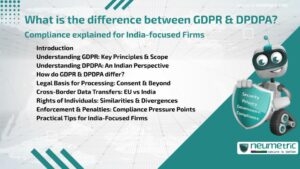Table of Contents
ToggleIntroduction
The CPRA stands for the California Privacy Rights Act, a California ballot proposition that expands upon the California Consumer Privacy Act by protecting Consumers’ personal information & compelling businesses to implement reasonable security procedures. While it was passed in 2020, the CPRA didn’t go into effect until Sun, 01-Jan-2023. While the CPRA is a California Legislation, it is a law that has impacted businesses nationwide &, in some cases, worldwide. The CPRA will apply to anyone who does business with California residents, which effectively means businesses in Europe & Canada too if they try to advertise to consumers in California.
The California Consumer Privacy Act [CCPA] is a recently passed law in the state of California which details the rights that California consumers have in relation to how their personal information is collected, used & shared when visiting a website. California is the first US State to pass this type of Data Privacy Legislation. The Bill was signed into law in June 2018 & came into effect on Wed, 01-Jan-2020. While similar in spirit to aspects of the European Union’s General Data Protection Regulation [GDPR], there are key differences that make CCPA unique, so being GDPR-Compliant is not equal to being CCPA-Compliant. We’ll compare the two in more detail later in this guide.
Overview of CPRA & CCPA
CPRA: The California Privacy Rights Act [CPRA] was passed in 2020 & took effect on Sun, 01-Jan-2023. The CPRA builds on the CCPA & expands on its provisions, granting California residents additional privacy rights & imposing a greater responsibility on businesses to protect consumer data. One significant change introduced by the CPRA is the creation of a new category of “sensitive personal information”, which includes data such as Social Security Numbers [SSNs], Driver’s Licence Numbers & Passport Numbers. This information is subject to heightened protection requirements & consumers have the right to restrict.
CCPA: The California Consumer Privacy Act [CCPA] was signed into law in 2018 & went into effect on Wed, 01-Jan-2020. The CCPA gives California residents certain rights over their personal information such as the right to know what categories of personal information a business collects about them, the right to request that this information be deleted & the right to opt-out of the sale of their personal information. Under the CCPA, businesses must provide California residents with a Privacy Policy that describes the types of personal information collected, the purpose for which it will be used & the categories of third parties with whom it will be shared.
Implementation of both laws by companies:
To comply with the CPRA, companies may need to make significant changes to their data handling practices including implementing new processes for handling sensitive personal information, updating their data minimization practices & revising their data retention policies. The CPRA also includes provisions that give consumers more control over their data, such as the right to restrict the use of their personal information.
Many companies have implemented changes to comply with the CCPA. For example some of the companies have updated their privacy policies to include CCPA-required disclosures, created new opt-out mechanisms & updated their data security practices. However many companies have found the CCPA’s requirements to be challenging to implement, particularly given the lack of clear guidance from regulators on how to comply with the law.
Differences: CPRA vs CCPA
Sharing: In CPRA, the disclosure of personal information to third parties for the context of behavioural advertising includes sharing for free, monetary gain or any other value while in CCPA the original version did not reference the sharing of personal information.
Contractor: In CPRA, Contractor is an individual who an organisation has made a consumer’s personal information available to, for business purposes established by a written contract. The original version did not define a contractor.
Scope of Applicability: The CPRA applies to more types of businesses than the CCPA, including certain businesses that process large amounts of consumer data or that share data with third parties.
Consumer Rights: In CPRA Consumers have the right to know what personal information is being collected about them, how it’s used & if it’s sold to or shared with any third parties. Consumers have the right to rectification & can request to access, amend, correct or delete their personal data, while in CCPA Consumers had the same right to know what personal information is being collected about them, how it’s used & if it’s sold to or shared with any third parties under the original version of the CCPA
Enforcement & Penalties: The CPRA & CCPA have similar penalties of $2500 per incident & $7500 per intentional incident.
What Companies Should Do to Comply with CPRA & CCPA
To comply with both CPRA & CCPA Regulations, companies should consider the following steps:
Understand the Scope of regulations: It is important for companies to understand which aspects of their data collection & privacy practices are covered by the Regulations. Companies should review the definitions & requirements outlined in the Regulations to ensure they are complying with all applicable provisions.
Develop Privacy Policy: One of the key requirements of both CPRA & CCPA is the development of Privacy Policy that includes a description of the types of personal information collected, how it is used & how individuals can exercise their rights under the regulations. Companies should ensure their Privacy Policies are up to date, accurate & easily accessible by individuals.
Implement Data Retention & Deletion Policies: Both Regulations require companies to implement processes to retain & delete personal information in accordance with specific timelines. Companies should develop Data Retention & Deletion Policies aligned with these requirements & regularly review & update these Policies as needed.
Ensure Data Security: Companies should implement appropriate security measures to protect personal information from unauthorised access, use or disclosure. This includes conducting regular risk assessments, implementing technical & organisational safeguards & ensuring Employees are properly trained on data security measures.
Facilitate consumer access & rights: Both Regulations provide certain rights to consumers such as the right to access, delete & opt-out of the sale of their personal information. Companies should develop processes to facilitate these requests & make it easy for individuals to exercise their rights.
Best practices for Handling Consumer Data & Privacy Policies:
- Prioritise privacy & data protection: Companies should prioritise privacy & data protection as core business value.
- Implement Privacy by Design: Companies should integrate privacy considerations into all aspects of their business from product development to marketing & customer service.
- Minimise Data Collection: Companies should collect only the minimum amount of personal information necessary to achieve their business goals.
Ongoing compliance with CPRA & CCPA is critical to maintain consumer trust & avoid Regulatory fines & penalties. Companies should regularly review & update their privacy practices to ensure Compliance with changing Regulations & consumer expectations.
Future Implications of CPRA & CCPA
The CPRA & CCPA have already had significant implications for consumer privacy & data protection. By giving individuals more control over their personal information & placing additional requirements on companies that collect & use that information these regulations are helping to promote greater transparency & accountability in the handling of consumer data. Additionally, the regulations are helping to raise public awareness about the importance of privacy & data protection, which could lead to broader changes in how companies handle personal information.
Looking ahead, the CPRA & CCPA may serve as a model for other States & Countries considering similar Regulations. As the digital economy continues to grow & more personal information is collected & used by companies there is increasing demand for stronger privacy protections. By taking a proactive approach to Privacy Regulations, other jurisdictions may be able to promote greater trust & confidence in the digital economy & mitigate the risks associated with data breaches & other data related issues.
Overall long-term effects of CPRA & CCPA on consumer privacy & data protection are likely to be significant, particularly as other states & countries begin to consider similar Regulations. While there may be some challenges associated with implementing & enforcing these Regulations, the potential benefits in terms of increased consumer trust, stronger data protection & better privacy controls are likely to be substantial.
Conclusion
The CPRA & CCPA are the two important Regulations that have significant implications for consumer privacy & data protection. These Regulations give individuals more control over their personal information & place additional requirements on companies that collect & use that information. By promoting greater transparency & accountability, the Regulations are helping to raise public awareness about the importance of privacy & data protection & promote greater trust & confidence in the digital economy.
Some key points are that the CPRA & CCPA may serve as a model for other States & Countries considering similar Regulations. Compliance with these Regulations is crucial for companies to maintain the trust of their customers & to protect their personal information. Additionally, it is important for companies to stay informed about future Privacy Regulations as the digital economy continues to evolve.
Overall, prioritising consumer privacy & data protection is crucial for maintaining trust & ensuring the long term sustainability of the digital economy. The CPRA & CCPA are important steps in this direction, but more work remains to be done to ensure that individuals have control over their personal information & that companies are held accountable for their data handling practices.
FAQS
What is CPRA full form?
CPRA stands for California Privacy Rights Act.
What is the CPRA Law in California?
The CPRA is an amendment to the California Consumer Privacy Act [CCPA] that was passed in 2020. It adds additional protections for consumer privacy, including stronger opt-out & data deletion requirements & establishes a new state agency, the CCPA to enforce the law.
Who does the CCPA & CPRA apply to?
The CCPA & CPRA apply to businesses that collect personal information from California residents & meet certain criteria such as having annual gross revenue of $25 million or more or deriving at least 50% of their annual revenues from selling consumer’s personal information.
What is a key way the CPRA impacts the CCPA?
Key way that the CPRA impacts the CCPA is by expanding the definition of “personal information” to include additional categories such as precise geolocation data, biometric information & inferred information.
What personal information is protected under CCPA & CPRA?
The CCPA & CPRA protect a wide range of personal information including but not limited to names, addresses, email addresses, social security numbers, financial information, internet activity, geolocation information & biometric data.





